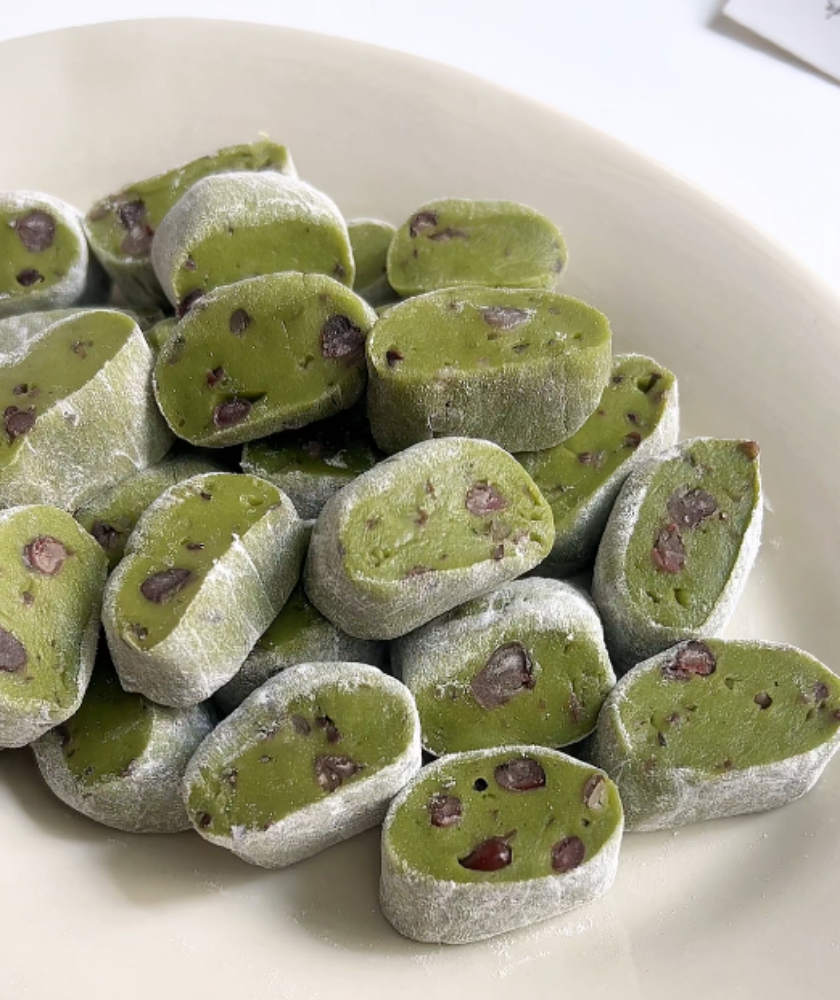Matcha Mochi With Red Bean Paste Recipe


As a food blogger who loves to share, my kitchen stories always include those heart-warming desserts. Today, let me take you into the refreshing world of matcha and reveal the secrets of making soft, chewy and fragrant matcha mochi!
What is Matcha Mochi
Let's start with the origin of the recipe. Matcha, which originated in China, was later developed in Japan and became a unique symbol of tea culture. Its unique tea fragrance and slightly bitter taste are unforgettable. Mochi, on the other hand, is a traditional glutinous rice product from Asia. It has a soft, glutinous and elastic taste and is deeply loved by people.

When these two meet, a delicious miracle like matcha mochi is created. Imagine the mochi is soft and chewy on the outside, and the matcha filling is full of fresh tea fragrance on the inside. Every bite is an ultimate temptation to the taste buds. It is not just a snack, but also a cultural exchange and collision, allowing people to taste the unique charm of different cultures while tasting the delicious food.
When making matcha mochi, we not only need to use high-quality matcha powder and glutinous rice as raw materials, but also pay attention to every detail in the production process. From stirring, steaming to molding, each step is crucial, so that we can make matcha mochi that is both beautiful and delicious.
Ingredients Needed and Substitutions
Ingredients needed to make delicious matcha mochi include:
Main ingredients:
Glutinous rice flour and corn starch: As the main ingredients, they give mochi its stickiness and chewiness.
Matcha powder, sugar: provide the unique aroma and taste of matcha mochi.
Milk and butter: make mochi softer and add milky flavor.
Sweetened red beans: As a filling for mochi, they provide sweetness and texture.
Alternatives:
Corn starch: Can be replaced with tapioca starch or other starches.
Matcha powder: can be replaced with green tea powder or other tea powder.
Sugar: You can use brown sugar, honey or other sweeteners instead.
Milk: You can use plant milk (such as soy milk, coconut milk) or water instead.
Butter: Can be replaced with plant-based butter or vegetable oil.
Candied red beans: can be replaced with other bean fillings, such as red bean paste or mung bean paste.
What is matcha mochi made of?
Actually, matcha mochi is mainly made of glutinous rice flour, matcha powder, milk, sugar and other ingredients. Glutinous rice flour gives it a soft and sticky texture, while matcha powder brings a refreshing tea fragrance and unique color. Of course, in order to make the taste richer, some recipes will also add corn starch, butter and other ingredients.
During the production process, we need to mix these ingredients evenly, and then steam or bake them to get soft, sweet, and fragrant matcha mochi! Every bite will make you feel full of happiness!
How much caffeine is in matcha mochi?
The caffeine content in matcha mochi depends mainly on the amount of matcha powder used. According to the Japanese Ministry of Education, Culture, Sports, Science and Technology's "Japanese Food Standard Composition Table", 1 gram of matcha powder contains 32 mg of caffeine. Generally speaking, the amount of matcha powder used in making matcha mochi is not particularly large, so the caffeine content in each piece of matcha mochi is relatively limited.
However, please note that different brands and recipes use different amounts of matcha powder when making matcha mochi, so the specific caffeine content will also vary. If you have strict requirements on caffeine intake, it is recommended to carefully check the recipe or consult the merchant when making or purchasing!
Tips for Success
First of all, the ratio of ingredients is very important. Glutinous rice flour, corn starch and matcha powder should be mixed evenly first, so that the matcha flavor can be evenly distributed. I usually mix it in a ratio of 2:1, which tastes best.
When adding milk, stir while adding it to make the batter smooth and fine without any lumps. And stir in one direction so that the ingredients can blend better.
Cooking the batter is the most important thing. Cook it slowly over low heat and stir it constantly, just like you are taking care of a little baby. When you see the batter slowly thicken and become shiny like paste, it means it is almost done. You need to be patient in this process, otherwise it will easily become burnt or have a raw powder smell.
When adding butter, be sure to add it while it is hot. The freshly cooked batter and butter quickly blend together, making the mochi more moist and adding a rich milky flavor.
Finally, the candied red beans are the finishing touch. When wrapping or putting the candied red beans, they should be evenly distributed so that you can bite the sweet red beans in every bite, which is a perfect match with the fresh and soft taste of matcha mochi.
INGREDIENTS
Main Ingredients
-
·150g Glutinous rice flour
-
·45g Corn starch
-
·8g Matcha powder
Additional Ingredients
-
·30g Granulated sugar
-
·230g Milk
-
·15g Butter
-
·30g Honey red beans
COOKING STEP
Step 1
Mix 150g glutinous rice flour, 45g corn starch, 8g matcha powder and 30g sugar.

Step 2
Add 230g of milk and stir until smooth.

Step 3
Filter into a non-stick pan, add 15g of butter, heat over low heat and stir into a dough.

Step 4
Let the dough cool and stretch it repeatedly until it is smooth.

Step 5
Heat 30g of candied red beans, mix evenly, roll into long strips, and coat with cooked glutinous rice flour.

Step 6
Cut into small, even pieces and you're done.

How to store matcha mochi
Store at room temperature: If it can be eaten within 1-2 days, it can be stored at room temperature, in a cool, dark and dry place.
Refrigerate: If you want to finish eating it within 3-4 days, it is recommended to put it in a fresh-keeping bag and refrigerate it.
Frozen storage: Wrap each one with plastic wrap and freeze it in the refrigerator. It can be kept for a month. When you want to eat it, just take it out and bake it in the oven. It tastes better.
Serving Suggestions
First of all, matcha mochi is a perfect match with a cup of hot green tea or matcha latte. The refreshing aroma of matcha and the soft and glutinous texture of mochi complement each other, and a cup of mellow tea allows you to enjoy a sense of tranquility and comfort while tasting the delicious food.
If you like a richer taste, you might want to try eating matcha mochi with some fruit. For example, cut a piece of matcha mochi and put a few slices of fresh strawberry or mango in it. The sweet and sour taste of the fruit and the sweetness of the mochi will definitely give you a new taste experience.
In addition, matcha mochi can also be used as a snack for breakfast or afternoon tea. In the morning, with a cup of milk or soy milk, it can inject full vitality into your day; in the afternoon, with a cup of coffee or black tea, you can find a little relaxation and enjoyment in your busy work or study.
You can also make creative combinations of matcha mochi according to your taste and preferences. For example, you can dip mochi in condensed milk or honey, or chop mochi into pieces and mix them into ice cream, which will give you a different taste!

















